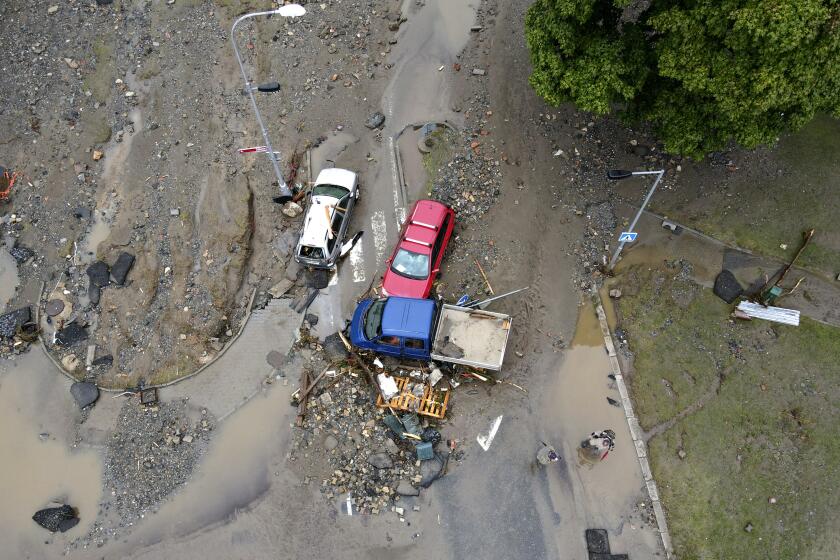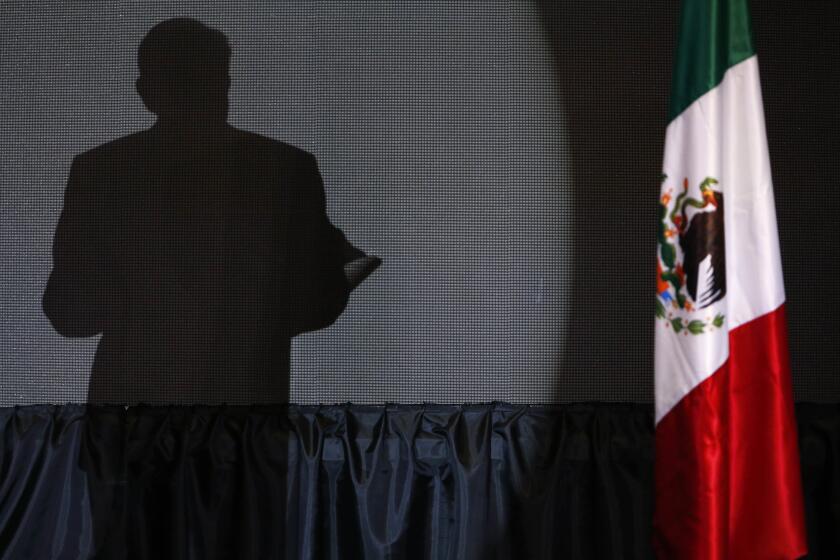Bills Before Congress Revisit Coastal Drilling
Anxious about high energy prices, lawmakers from both parties are launching a new, more determined drive to relax the long-standing ban on new drilling off most U.S. coasts.
They have been thwarted before. But this time, their efforts may benefit from a more favorable political climate.
That worries much of the California Democratic congressional delegation, some of whose members went on the counteroffensive Thursday by introducing legislation to permanently ban new energy exploration off the state’s coast.
The California legislation comes in response to a spate of bills designed to make offshore drilling more palatable.
One proposal calls for offering cash-hungry states a big chunk of drilling royalties if they permit energy exploration.
Another would allow rigs to operate off the California and Florida coasts -- if the states agree and the work sites are at least 100 miles offshore. At that distance, proponents say, they would be well out of sight of beachgoers.
Yet another measure would limit offshore drilling to natural gas, an attempt to ease concerns about oil spills blackening beaches.
These proposals show that efforts to relax the drilling moratorium have emerged as one of the top energy issues in the new congressional session.
“I do think it is something we will end up addressing,” said Rep. Richard W. Pombo (R-Tracy), chairman of the House Resources Committee.
In a sign of shifting attitudes on the issue, Florida senators who have stood firmly against new coastal drilling have introduced legislation that would open a section of the eastern Gulf of Mexico to exploration. The bill is an effort to head off a push to allow drilling in a larger area in the Gulf.
New offshore drilling is prohibited -- except in parts of the Gulf of Mexico and areas off Alaska -- under a federal moratorium that was put in place in 1981. That ban is set to expire in 2012.
Sen. Pete V. Domenici (R-N.M.), chairman of the Senate Energy and Natural Resources Committee, said Congress should approve opening up new areas to offshore drilling to send a message that Washington is “serious about taking action to increase the domestic supply of natural gas and to reduce the cost of energy.”
Environmentalists are worried about the drilling proposals.
Melinda Pierce, a Sierra Club lobbyist, said that with the defeat in Congress last year of President Bush’s plan to open part of Alaska’s Arctic National Wildlife Refuge to energy exploration, the energy industry sees the coastal waters as “their next-best opportunity.”
Pierce said she viewed the legislation that would offer enticements to states to opt out of the drilling moratorium as a bid to “drive a wedge” in the bipartisan coalition of coastal-state lawmakers that had blocked previous efforts to weaken the ban.
Backing the bill that would permanently prohibit new drilling off the California coast were the state’s two senators, Democrats Barbara Boxer and Dianne Feinstein, and all but one of the state’s 23 House Democrats.
The exception, Rep. Jim Costa of Fresno, could not be reached for comment on his position.
“While we have all been well-served by the bans on new coastal oil drilling for the last 25 years, these important protections are increasingly threatened,” Rep. Lois Capps (D-Santa Barbara) said in a statement.
A spill from an oil platform off the coast of Santa Barbara in 1969 caused extensive environmental damage.
The bill also would exclude California from a survey of offshore energy resources -- a provision included in the energy policy legislation signed into law by President Bush last year. Critics say the seismic technology used in the survey could damage marine life, an assertion that industry officials dispute.
Capps is seeking support for the bill from California’s 19 House Republicans.
Jeremy Rabinowitz, her chief of staff, said, “It is our hope that with the oil companies’ renewed interest in drilling off California, the entire delegation will pull together to protect our coast.”
One Republican who had been outspoken in defending the ban on new offshore drilling is no longer in Congress: Randy “Duke” Cunningham of San Diego, who resigned last year after pleading guilty to bribery. His seat is vacant.
Pombo, head of the House Resources Committee, looms as a major obstacle to the bill.
The legislation probably will be assigned to his panel, and he said, “I don’t think you’ll see it go anywhere.”
He said that although the measure did “reflect the will of California,” he favored legislation that would address the energy exploration issue for every state, allowing each to decide whether it wanted to permit drilling.
“There are states like California and Florida that don’t want any kind of offshore development,” he said. “In order to address the needs and concerns of all the different states ... we [should leave] it up to the states to make the decision.”
The Senate’s energy committee on Thursday held a hearing on a bill that would open to new drilling a section of the eastern Gulf of Mexico. Sen. Jeff Bingaman of New Mexico, the panel’s ranking Democrat, has joined with Domenici in co-sponsoring a bill.
But in a sign of how energy issues frequently scramble party lines, the measure is opposed by Florida’s two senators -- Republican Mel Martinez and Democrat Bill Nelson.
The Domenici-Bingaman bill would affect about 3.6 million acres in the eastern Gulf.
The area was not covered by the 1981 drilling moratorium, but has been off-limits to development under an agreement reached between Bush and his brother, Florida Gov. Jeb Bush, that expires in mid-2007.
Martinez and Nelson have proposed legislation that would open up a smaller area of the eastern Gulf to drilling -- but only in return for a permanent, no-drilling zone that extends at least 150 miles off the rest of the Florida coast and renews the nationwide drilling moratorium until 2020.
More to Read
Sign up for Essential California
The most important California stories and recommendations in your inbox every morning.
You may occasionally receive promotional content from the Los Angeles Times.











